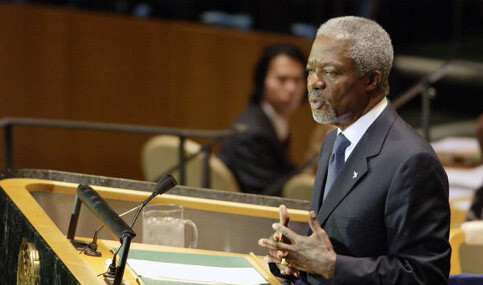United Nations News Service 17 July 2006

Secretary-General Kofi Annan addressing the General Assembly. (UN/Evan Schneider)
The United Nations Security Council should discuss a package of practical actions aimed at stemming the spiraling violence in the Middle East, as well as the possibility of a new stabilization force for the region, Secretary-General Kofi Annan said today following meetings with the Group of 8 countries in Saint Petersburg, Russia, where he also called on the parties to avoid civilian casualties.
Speaking to reporters at a press encounter with British Prime Minister Tony Blair, Mr. Annan said he would continue efforts to address the situation in Lebanon with other leaders and predicted that several countries in Saint Petersburg which are also key members of the Security Council would work with the UN to get “a package of actions, not exhortations, a package that is action-oriented, that is practical, that requires the parties to release their abductees, stop the katushas going in, Israel to stop its retaliatory actions and to pursue this idea of a stabilization force.”
The aim would be to “move very quickly and appeal to governments once that package is approved to make sure that we have the troops, well-trained, well-equipped troops that can go in quite quickly,” he said, adding: “That will be part of the work that I will be doing this morning and then we will follow it up in New York.”
Mr. Annan said the team he dispatched to the region – led by Vijay Nambiar and including Terje Roed-Larsen and Alvaro de Soto – would report to the Security Council on its return.
An international presence in Lebanon is “something that the Security Council will have to discuss,” he said in response to questions, adding that the team would report “towards the end of this week depending on the progress they make in the region.” The Council should then discuss plans “and report on practical suggestions they come with but pursue the package that the Prime Minister and I have discussed, including the stabilization force.”
The sooner the Council takes a decision on the matter “the better it is,” he said. “But the parties need not wait for full implementation of that to stop the cessation of hostilities and to spare the civilians,” he added.
“I have appealed to all concerned to spare civilian lives, to spare civilian infrastructure because these are things the civilian population will need for their livelihood for their daily activities and we should not inflict any more suffering on them,” he said, repeating his longstanding call that both parties “should bear that in mind and respect international humanitarian law.”
The Secretary-General emphasized the need for the parties “to agree as soon as practicable to a cessation of hostilities” and noted that “to do that, they need to give diplomacy time and space for us to work.”
He acknowledged that “the fighting may continue for a while” but once again appealed to the parties “to focus their targets narrowly and to bear in mind that under international humanitarian law they have an obligation to spare civilian lives, they have an obligation to spare civilian infrastructure, they have an obligation to stay away from targets like electricity and communication and things that civilians need for their livelihood.”
He added that when it comes to seeking donations for relief operations, “what is important is that not that we go out and collect humanitarian money and reconstruction money – yes we will need that in time – but we have to do whatever we can to stop the destruction and the killing as much as we can.”
The UN, which has a presence on the ground, is “looking at possibilities of taking dependents out of Lebanon.” That, he added, “implies that the situation is extremely dangerous and if that is the case, that is one more urgent reason for us to do whatever we can to get the parties to bring a halt to this.”
Related Links